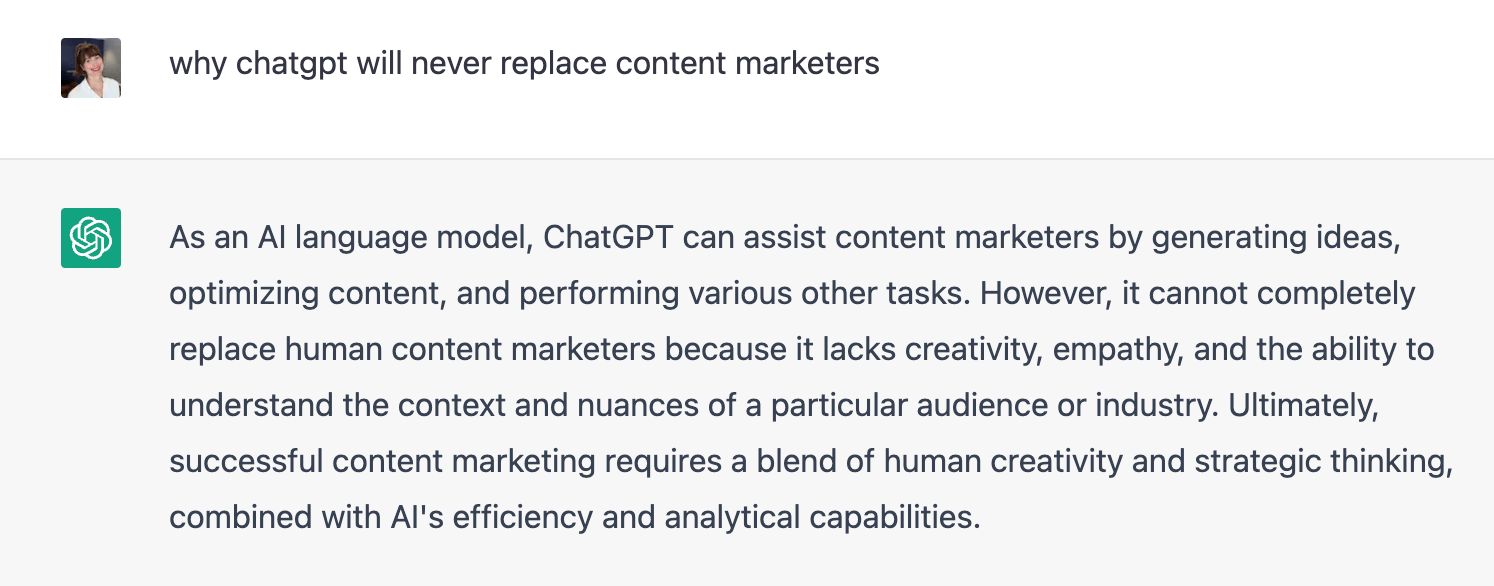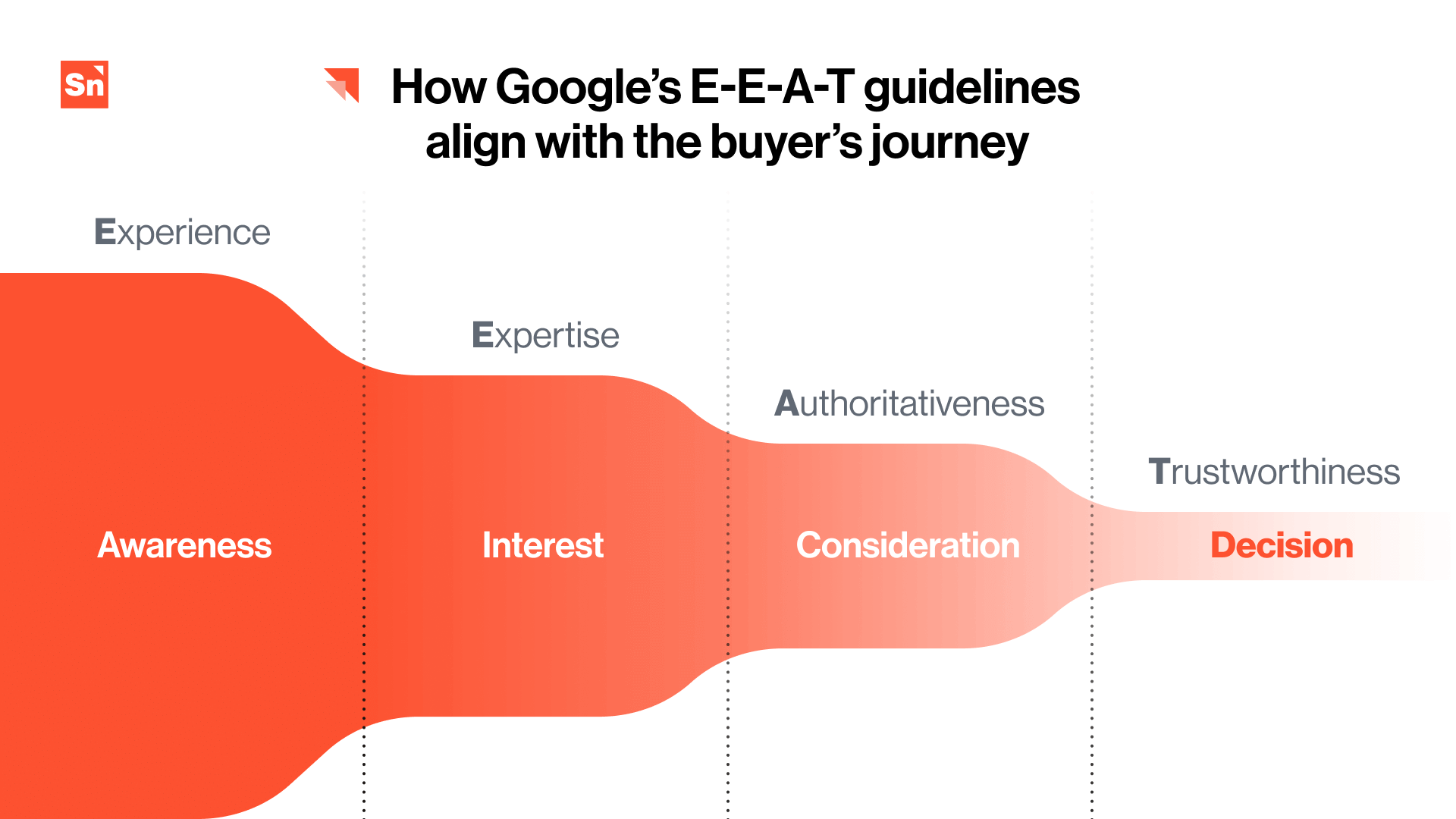AI made huge waves at the end of 2022 when ChatGPT hit the mainstream. ChatGPT was discussed ad nauseam on LinkedIn and in daily business conversations.
I was justifiably nauseous over ChatGPT’s claim to fame…content. I’m a lifelong writer and a decade-long content marketer who has poured a ton of love and energy into growing a video marketing agency over the past six years.
ChatGPT was taking over my usual can-do mindset. I was stuck in a ridiculous vortex of AI obsession, wondering about:
- The fate of our business.
- The fate of content marketing.
- The fate of the written word.
- The fate of human communication.
Finally, I got a grip and decided to size up my competition.
ChatGPT vs. Me
When I first took ChatGPT for a spin, I tried getting some video topic ideas. Eh, they were generic but not off-base. I could see how an AI tool like this could be useful for overcoming creative blocks when you desperately need to jumpstart the content ideation process.
Then, I watched a YouTube video of a guy trying to use ChatGPT to create an entire blog post. Good God, it was a Herculean task for him to produce this content. He had an entire tech stack dedicated to this process, which mostly served as a way to cover his ass when paraphrasing ChatGPT’s robotic content.
His main concern was making sure this AI-generated blog would pass one of those plagiarism/AI checkers as original content. Hmmm…here’s an idea. Why don’t you just create original content instead?
At first glance, as the AI frenzy ensued, ChatGPT seemed poised to take on a variety of creative content marketing tasks. A little bit of experimentation has proven that AI just doesn’t have the ability to replace the personal, creative approach of an expert human—otherwise known as “the content marketer.”
ChatGPT vs. Content Marketers
Content marketers can rest a little easier at night knowing that ChatGPT can’t replace human communication. Turns out that ChatGPT knows this too.
I went straight to the source to ask ChatGPT why it can’t replace content marketers, and here’s what it had to say:
As an AI language model, ChatGPT can assist content marketers by generating ideas, optimizing content, and performing various other tasks. However, it cannot completely replace human content marketers because it lacks creativity, empathy, and the ability to understand the context and nuances of a particular audience or industry.
Ultimately, successful content marketing requires a blend of human creativity and strategic thinking, combined with AI’s efficiency and analytical capabilities.

ChatGPT does have some practical applications—as a marketing assistant rather than a content creator. It can complete rote tasks and is definitely useful for research and brainstorming. However, the importance of creativity, empathy, and understanding in content marketing cannot be understated.
Creativity
Around Superneat, we call ChatGPT a word calculator. A calculator doesn’t output creativity, and neither does ChatGPT. It’s unable to create fresh concepts or take a strong stance.
For a truly successful marketing strategy, you’ll need to develop unique content ideas and infuse them with your brand’s voice and values. You can spend time training ChatGPT to understand your audience, and use it for ongoing research and content ideation. But content creation still needs human creativity.
Empathy
Another area where ChatGPT is lacking is human empathy. The best content marketing appeals to the audience’s lived experience, taking their emotions and struggles into account.
AI-generated content, on the other hand, tends to feel cold and disconnected. Although ChatGPT might sound similar to a human, it lacks the empathy and emotional intelligence that experienced marketers bring to their content. This is the emotional connection that makes or breaks a piece of content.
Understanding
The final piece of the puzzle here is the human ability to understand the context and nuance behind a piece of information.
A true sense of understanding is particularly important to keep in mind if you need to produce technical or industry-specific content to reach your audience. While ChatGPT may be able to summarize complex topics, it can’t replicate the strategy and understanding that content marketers bring to the table.
ChatGPT vs. Google’s Algorithm
Google updates its search engine algorithm and guidelines on a regular basis. The search engine recently announced that it would be “rewarding high-quality content, however it is produced.”
Technically, Google isn’t inherently penalizing AI-generated content. But that doesn’t mean it will help you score SEO brownie points either.
Google’s algorithm has long prioritized “people-first” content rather than “keyword-first” content written specifically for search engines. Remember the days when people used to keyword-stuff the bejesus out of their content? Ew, gross.
The most recent Google algorithm update prioritizes E-E-A-T when evaluating content:
- Experience
- Expertise
- Authoritativeness
- Trustworthiness
These qualities are typically lacking in ChatGPT’s content, so you’ll want to think twice before using AI as a prominent player in your strategy.
The nice thing about following Google’s E-E-A-T guidelines is that they align beautifully with the buyer’s journey.
Awareness (Top of the Funnel)
Experience: Relate to your buyer by creating informative content based on first-hand experiences to help them understand their problem.
Interest (Top-Mid Funnel)
Expertise: Pique their interest by showing them that you deeply understand their problem and that you know the type of solution they need.
Consideration (Middle of the Funnel)
Authoritativeness: Support the buyer’s solution research phase by demonstrating that you are the undeniable authority on this topic.
Decision (Bottom of the Funnel)
Trustworthiness: Validate the buyer’s decision by showing you are the resource they can always trust to solve their challenges.

Experience
The experience component is a new addition to Google’s content guidelines. What used to be a more svelte acronym for their guidelines (E-A-T) has become a bit awkward (E-E-A-T). But, personally, I effing love what the extra “E” stands for: Experience.
Google now places more value on content written by people who have first-hand experience with the topic they’re writing about. This new guideline is intended to prevent content written by inexperienced people (or robots) from ranking well.
A high level of first-hand experience is essential to building trust with your audience. It’s also something that ChatGPT cannot replicate. Instead, focus on working with your subject matter experts to create high-quality content that reflects their unique life experiences.
Expertise
ChatGPT has its own disclaimer that says, “ChatGPT may produce inaccurate information about people, places, or facts.” And, for anyone using the free standard version of ChatGPT, the knowledge cutoff is September 2021.
Generic, surface-level content isn’t going to meet Google’s “expertise” requirement. Google prefers expert-written content that dives deep into the topic at hand and draws on a wealth of knowledge. It needs to be current and accurate.
Authoritativeness
Authoritativeness focuses on the reputation of the author and/or publisher. Do others in your space look to you as a leader? What sort of credentials do you have in your field? Can you demonstrate your authority in your writing?
This distinction is what Google looks for when evaluating authority. And it’s another area where creating content collaboratively with subject matter experts will help you score well with Google’s E-E-A-T content guidelines.
Trustworthiness
The final and most important component of E-E-A-T is trustworthiness. This metric is a combination of the experience, expertise, and authority demonstrated in your content. It also reflects factors like the accuracy and usefulness of your content.
People do business with businesses they trust. Your content will serve as a vehicle of trustworthiness—as long as you build trust via human connection and ingenuity, not through AI-generated content.
The Last Thing You Want Is Generic Content
ChatGPT’s innovative language model is somewhat impressive, but right now it feels more like a shiny new toy than a functional content marketing tool.
If we look at the “Wonderful Wizard of AI” behind the curtain, he’s back there just ripping off semi-outdated information on the internet and serving up recycled content that’s repetitive and oftentimes flat-out inaccurate. He’s back there, just calculating words.
The only way your content strategy will be effective is if your messaging is effective.
People are bombarded by huge volumes of content every day. Your content needs to resonate with your target audience and upstage your competitors. The last thing you want is generic content.
